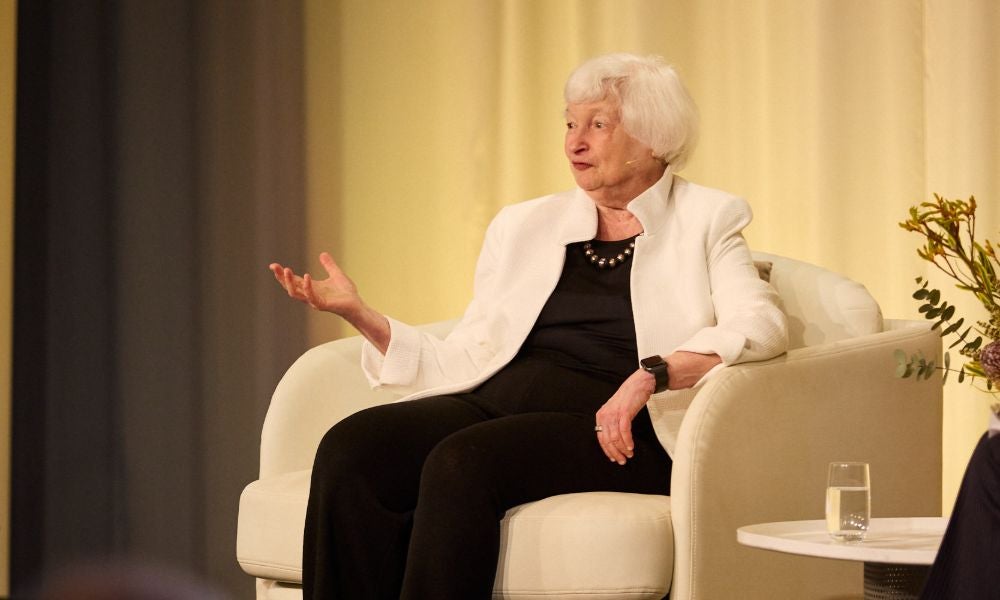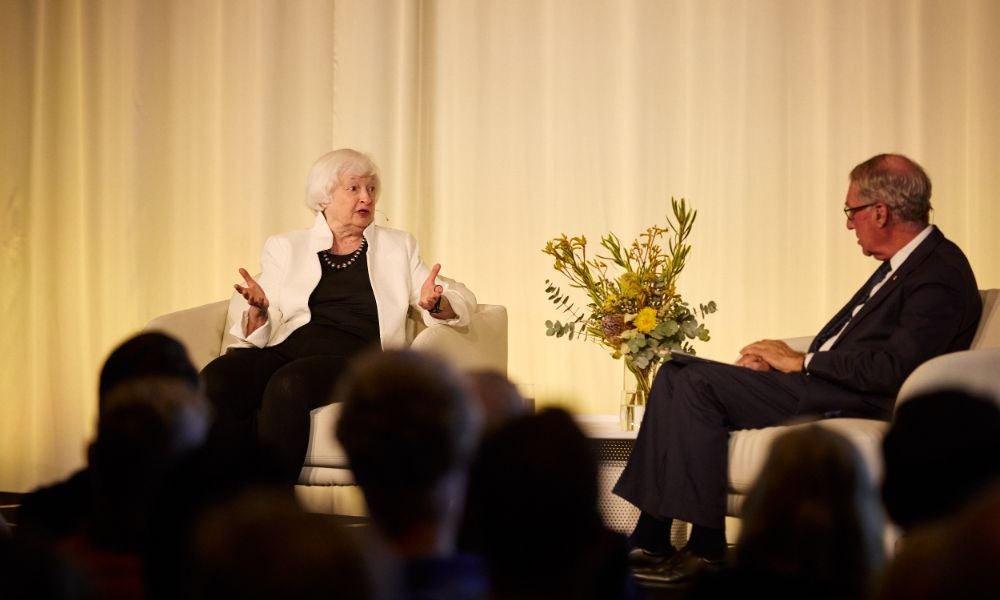“A tariff is a tax”: Janet Yellen warns tariffs could trigger recession
Former US Treasury Secretary Janet Yellen cautioned against Trump's trade policies, highlighting global risks for businesses and consumers
Former US Treasury Secretary and Federal Reserve Chair Janet Yellen has issued a sobering warning about the dangers of escalating trade protectionism, saying that proposed tariffs under a second Trump administration could be “extremely unwise and damaging”. She cautioned that the Trump administration’s pledge to impose further tariffs from 2 April 2025 could have devastating consequences for both the US and its global trading partners.
Secretary Yellen made these remarks at an inaugural 'In Conversation With' event hosted by UNSW Business School, moderated by Chancellor David Gonski AC. The event marked the launch of the school’s flagship speaker series and delved into global economic uncertainty, leadership, and the future of international trade.
“This is an extremely unwise and damaging program. It’s damaging to the United States, and it’s also damaging to our neighbours in the global economy,” she said. “What the Trump tariffs threaten to do is to cause a recession in the United States by curtailing investment.”
She added a message of caution for Australia: “My hope is that Australia will not be badly affected by the Trump tariffs. And as I would say, as you think about how to respond, remember that tariffs tend to harm countries that put them in place.”
Rising uncertainty for business
Secretary Yellen, an American economist who served as the 78th United States Secretary of the Treasury from 2021 to 2025 and as Chair of the Federal Reserve from 2014 to 2018 under Presidents Barrack Obama and Joe Biden, also warned that Trump’s trade agenda could destabilise international markets and create long-term uncertainty for global businesses.
“I think the Trump policies have created so much uncertainty for businesses. What we’re seeing, if you talk to business people, and we’re seeing this also in soft data from surveys, is that business uncertainty is extremely high. Would you really want to make a major investment decision to bring manufacturing into the United States in a sector where the US is not competitive, just because President Trump has put tariffs in effect?”
She described tariffs on countries like Canada and Mexico as particularly damaging, given long-established free trade agreements and integrated supply chains. “All of the investment decisions that were made relied on the idea that this is a tariff-free zone. Suddenly, these investment decisions will be completely upended,” she said.
“These tariffs are already having an effect, boosting, for example, the cost of automobiles that rely on imported aluminium and steel… it’s estimated that for the United States, the cost of an automobile will rise between $5000 to $10,000.”
Photo gallery: UNSW Business School's 'In Conversation With' Janet Yellen
But it’s not just companies that will pay; the tariffs will also harm the very people they are supposedly trying to protect – US consumers. “From the US point of view, I think these tariffs are going to be extremely damaging in a number of ways for consumers who have made it very clear that they're unhappy about inflation and the cost of living,” she told the audience.
“A tariff is a tax. It's a tax that boosts the cost of imports. Some of those imports are for consumer goods and virtually all the research that's been done suggests that the tariff is borne by the consumers. It's not the case that the country that produces and sells the goods into the United States is just going to absorb the costs of the tariffs. It is American consumers who will pay higher prices,” she said.
“It is American consumers who will pay higher prices. And for many of the consumer goods that we import into the United States, including from China, the consumers who particularly are going to be harmed are low-income consumers. This is like imposing a regressive tax that hurts low-income consumers the most.”
US tariffs “completely and totally misguided”
President Trump has threatened further trade sanctions from April on countries with value-added taxes (VATs). However, Secretary Yellen rejected claims that countries with VAT – such as Australia’s GST – were engaging in unfair trade practices.
“I think this is completely and totally misguided,” Secretary Yellen said. “Many countries have value-added taxes. Europe relies on them heavily. Other countries have them, and they are not discriminatory. It is not creating a competitive disadvantage. And to think that this is like a subsidy or an unfair trade practice, I regard as completely wrong.”

She noted that the World Trade Organisation had already ruled on this issue, confirming that VAT systems do not constitute unfair trade barriers.
Australia, which has maintained a free trade agreement with the US for two decades, will likely be affected by American tariffs on aluminium and steel. However, Secretary Yellen urged caution and warned against retaliation.
“Australia, I think, has benefited as many countries have, from a very open trading system,” she said. “And as I would say, as you think about how to respond, remember that tariffs tend to harm countries that put them in place. We’re seeing a lot of retaliation, which is natural, but it’s wise to remember that retaliation can also hurt your own economy.”
The US has a $7 trillion “tax gap”
During the conversation, Secretary Yellen reflected on one of her proudest achievements while leading the US Treasury: securing US$80 billion in additional funding for the Internal Revenue Service (IRS) over the next decade – an initiative now at risk of being dismantled by the new Trump administration, with Elon Musk serving as Senior Advisor to the President through the newly established Department of Government Efficiency.
“One of the things that I felt best about is that we succeeded in getting Congress to legislate an additional $80 billion over the next decade to the Internal Revenue Service,” she said. “The reason we wanted it is because the staff had been cut to the bone, and the consequences were that the tax gap had escalated to close to $1 trillion a year.”
Read more: Janet Yellen: the very model of a modern Madam Secretary
She explained that the tax gap refers to the difference between the amount of tax that should be collected under current law and the amount that is actually paid. “The estimate of the tax gap for the United States over the next decade is $7 trillion,” she said.
“And how could there be $7 trillion that wasn't being collected? Well, that's because the staff of the IRS had been cut to the bone, because there were members of Congress who really did not want to see wealthy individuals, complex partnerships and corporations having to pay the taxes that were due if they followed the tax law. The rate of auditing of these sophisticated entities in the United States fell to, and is currently, close to zero. That just encourages less taxpaying.”
She described the IRS investment as highly cost-effective. “This $80 billion that we got was estimated to result in 7 to 10 times as much tax revenue,” she said. “It was the best budget deficit-reducing expenditure you could possibly make. It had a payoff of 10 to 1.”
“What Musk did on his first day, at the Internal Revenue Service, was to say that he would fire most of what was called probationary workers and probationary workers to those who were there less than two years, and those are all of the people who were hired to, these were the auditors, the IT specialists, the tax lawyers who were hired and opening investigations to try to collect that missing $7 trillion.”

Secretary Yellen criticised recent moves to cut IRS staff, warning that undermining enforcement capacity would only deepen the deficit. “This is not really about efficiency in government or reducing the deficit,” she said. “There is more loss from [cutting IRS staff] than every other penny that will be saved.
“The reason our deficits are large is because three programs – Social Security, Medicare and Medicaid – are increasing in size relative to the economy as our economy ages,” she continued. “We knew this was going to happen for 30 years. We've had many chances to deal with it. We haven't dealt with it, and we're seeing that play out."
Finally, she noted the impact of rising interest rates. “The cost of servicing government debt has risen and there doesn't begin to be enough cuts that are possible in the remainder of the spending to make a meaningful difference to the budget deficit," she added.
Recognising a trailblazer
During her visit to Sydney, Secretary Yellen was also awarded the degree of Doctor of Business, honoris causa, by UNSW Business School, in recognition of her distinguished career at the highest levels of global financial governance and her commitment to fairness and social responsibility.
Former Governor of the Reserve Bank of Australia, Philip Lowe, who delivered the closing remarks at the event, praised Secretary Yellen’s exceptional career and character. “We were governors of our respective central banks at roughly the same time,” he told the crowd.
Subscribe to BusinessThink for the latest research, analysis and insights from UNSW Business School
“The person that I’ve seen in those various roles – as an academic, as a central bank chief and as a senior government official – is really the very same person we’ve seen in this room tonight. That’s someone who is incredibly committed to making the world a better place, who greatly cares about people, who’s compassionate, who believes in international cooperation, who is erudite and thinks deeply about issues. She really cares for people and, I would add, is incredibly humble given all the first that she’s achieved.”
Dean of UNSW Business School, Professor Frederik Anseel, also praised her impact beyond economics: “Her influence extends far beyond economic policy, impacting broader societal issues such as income inequality, climate change, and financial regulation," he concluded.
